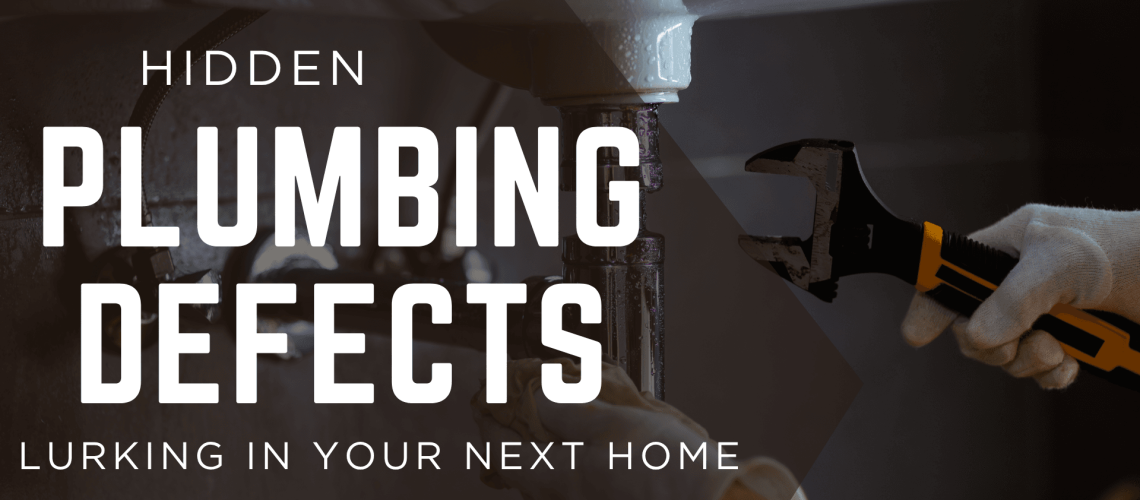When you walk through a home, you can see the paint, flooring, and fixtures — but the real story often lies behind the walls and under the floors. That’s especially true when it comes to plumbing.
In Somerville, Tennessee, and across Fayette County, plumbing issues are among the most common — and costly — problems I find during home inspections. They can range from small leaks that cause slow damage over time to major defects that lead to flooding, water waste, or hidden mold.
Whether you’re buying a century-old farmhouse or a brand-new build, it pays to know what’s going on in the pipes.
Why Plumbing Defects Are Easy to Miss
Water follows the path of least resistance — often behind drywall, under cabinets, or inside crawl spaces. Many leaks start small and go unnoticed until they’ve already caused damage.
Homebuyers typically run faucets and flush toilets during showings, but those quick checks can’t reveal slow drips, improper slope, or loose fittings hidden behind finishes.
That’s why a professional home inspection is so critical. Using moisture meters, infrared cameras, and experience from inspecting hundreds of homes across West Tennessee, I can identify early signs of plumbing trouble before it turns into a costly headache.
Common Hidden Plumbing Problems Found in Somerville Homes
1. Leaking Supply Lines
Flexible supply lines under sinks and toilets can loosen or crack over time. I often find corroded fittings or small leaks that drip just enough to damage cabinets and flooring.
Stainless-steel braided lines are far more reliable than the older plastic versions — and they’re an inexpensive upgrade every homeowner should consider.
2. Improper Drain Slope or Unsupported Pipes
Drain lines must be installed with the correct slope — typically ¼ inch per foot — so water and waste flow properly. If the slope is too steep or too shallow, water can back up or solids can settle, leading to clogs and odors.
In crawl spaces throughout Somerville, I’ve found drainpipes sagging between supports or disconnected entirely — sometimes from poor installation, sometimes from animals or soil movement.
3. Defective or Aging Piping Materials
West Tennessee homes built in certain decades used plumbing materials that are now known to fail:
- Galvanized steel (used before the 1960s) rusts internally, reducing flow.
- Polybutylene (PB) (common in the 1980s–90s) becomes brittle and prone to leaks.
- CPVC can crack if over-tightened or exposed to freezing temperatures.
If you’re not sure what kind of pipes your potential home has, an inspector can identify them for you and let you know if replacement is advisable.
4. Hidden Leaks in Crawl Spaces
Many homes in Somerville have crawl spaces — and it’s one of the first places I look for plumbing problems. Small drips from uninsulated lines, leaking drain traps, or poorly supported joints can add up to gallons of wasted water per day.
You can’t see these issues from inside the house, but over time they create moisture problems, mold, and even wood rot beneath the floor.
5. Water Heater Defects
Aging or improperly installed water heaters can pose serious risks. Common defects include missing drain pans, no TPR (temperature pressure relief) valve extension, or venting issues on gas models.
I also see water heaters located in areas without proper drainage — meaning a simple failure could flood part of the home.
6. Slow or Partially Clogged Drains
A sink or tub that drains slowly often indicates buildup or partial blockage. Sometimes the issue lies farther down the line — especially if multiple fixtures drain slowly. In those cases, a sewer scope inspection can reveal obstructions or root intrusion before you buy the property.
7. Leaks Around Showers and Tubs
Caulk and grout are your first line of defense against water intrusion, but they don’t last forever. Even tiny gaps around tubs or tile corners can allow water to seep into walls or subflooring, leading to hidden mold or soft spots.
I always check for moisture under bathrooms using a meter, even if everything looks fine on the surface.
How These Issues Affect Homebuyers
Plumbing defects don’t just mean leaks — they mean damage, odor, mold, and expense. A slow drip can destroy a cabinet, warp flooring, or rot framing long before you see a stain.
For buyers, that can mean unexpected repair bills or, worse, structural damage not covered by homeowners insurance.
That’s why it’s essential to have every home inspected by a licensed, experienced professional who knows how to spot early signs of trouble.
What I Look for During a Plumbing Inspection
As part of every full home inspection in Somerville and across Fayette County, I:
- Run all fixtures and appliances simultaneously to test pressure and drainage.
- Inspect visible supply and drain piping for leaks or corrosion.
- Check under sinks, in crawl spaces, and at the water heater.
- Verify that fixtures are properly vented and sealed.
- Test exterior hose bibs and main shutoff valves.
- Look for signs of prior water damage or moisture staining.
You’ll receive a detailed report outlining each defect, complete with photos and recommendations for repair or further evaluation by a licensed plumber.
The Bottom Line
Plumbing issues are easy to overlook but can be among the most expensive repairs a homeowner faces. A professional inspection helps you uncover leaks, defective materials, and hidden moisture before closing — giving you the power to make an informed decision.
At Upchurch Inspection, I take pride in helping homebuyers throughout Somerville and Fayette County avoid unexpected surprises. Whether your home is brand-new or fifty years old, a detailed plumbing inspection ensures you know what’s really happening behind the walls.
📞 Schedule Your Somerville Home Inspection Today
Serving Somerville, Oakland, Moscow, and all of Fayette County, Upchurch Inspection provides certified home inspections, plumbing evaluations, and specialized testing for mold, radon, water quality, and sewer systems.
📞 Call (901) 350-8885 or visit UpchurchInspection.com to schedule your inspection today.


